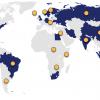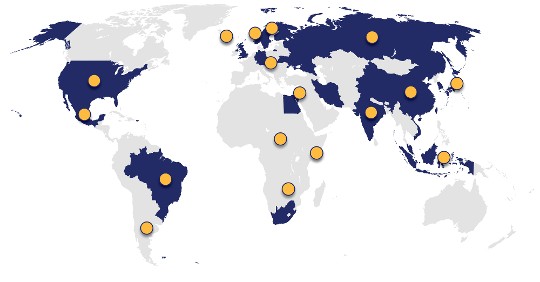
Options Magazine, Summer 2021: IIASA researchers collaborate with colleagues from member countries and partner institutions around the globe to develop holistic, systems-based solutions and provide policy advice for some of the most pressing problems society faces today.
- IIASA cohosted an online symposium with the Russian Presidential Academy of National Economy and Public Administration to share recent research and discuss challenges that demographers may face in studying demographic consequences of COVID-19.
- Innovative water modeling and scenario assessment tools developed at IIASA are helping policymakers in East Africa to identify the principal need for effective water management policies and improve water management in the region.
- As part of the Peking University (PKU)-IIASA Postdoctoral Program, IIASA hosted two joint postdoc fellows working on Water-Energy-Land nexus modeling and on regional water security for the countries of the Chinese government’s Belt and Road Initiative.
- In a multi-institute collaborative effort, researchers explored the impact of different combinations of non-pharmaceutical interventions to curb the spread of COVID-19 on reducing deaths, health demands, and lowering healthcare costs in Sweden.
 © IIASA
© IIASA
- IIASA provided essential support in the development of the EU’s Second Clean Air Outlook through model calculations carried out with the IIASA GAINS model.
- In Israel, a country suffering from chronic water shortages, IIAS researchers are co-developing a water resources management tool with Israeli colleagues.
- An IIASA-led study used systems analysis methods to measure trade interdependencies between US states and found that the country’s current food supply chain is often not optimized for using available natural resources.
- IIASA is providing modeling support to Argentina, China, and India to develop their Long-term Climate Targets (LTS) and Nationally Determined Contributions (NDCs) to the Paris Agreement with the objective of strengthening climate related policymaking, while simultaneously strengthening the capacities in local institutions to carry forward this work.
- An IIASA-led study found that to ensure universal access to affordable, reliable, and modern electricity services in sub-Saharan Africa by 2030, the pace of electrification must more than triple.
- Using a new analytical tool capable of simulating an optimal mix of public fund allocations and financial protection instruments for disaster risk reduction, IIASA researchers collaborated with colleagues in Japan to support the systematic analysis of public investment decisions in vulnerable African countries.
- IIASA researchers are assisting with the development of a National Forestry Accounting Plan and Forest Reference Levels for Iceland and Norway.
- Researchers created different scenarios of the effects of economic measures to tackle the COVID-19 crisis in Austria using a novel economic model developed at IIASA.
- IIASA works with the Ministry of Environment, Forest, and Climate Change in India (MoEFCC) to develop tools to assist Indian government agencies in evaluating targets for the Sustainable Development Goals (SDGs).
- NatureMap, an integrated global map of biodiversity, carbon storage, and other nature services, is now being applied in several countries, including Brazil, Indonesia, and Mexico. The work will contribute to decision making at the Convention on Biological Diversity and the
Climate Change COPs taking place in China and the UK respectively. - In 2020, IIASA joined forces with SAS, a global leader in analytics, innovative software, and services, to help fight deforestation and protect the planet using the next generation of crowd-driven artificial intelligence (AI).
The highlights include selected activities only, they are not comprehensive and do not aim at
providing an overview of IIASA’s regional research and policy activities.
